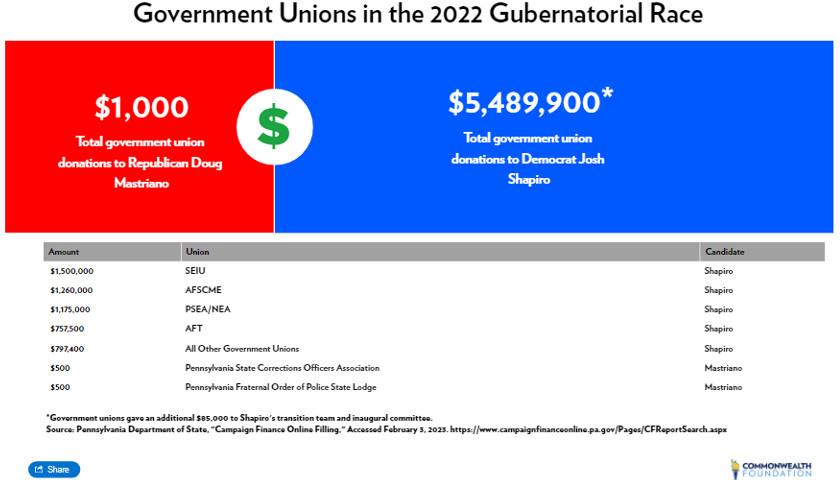Posts tagged private-sector unions

Chair Foxx Investigates 12 Unions for Recent Fraud, Corruption Seeks answers on protecting workers from further union malfeasance
March 18, 2024 // “The Committee on Education and the Workforce (Committee) is concerned about fraud, embezzlement, and corruption perpetrated by union officials. To ensure workers represented by labor organizations are shielded from malfeasance by union officials, the Committee requests documents and information relating to…efforts to protect employees and deter fraud, corruption, and improper accounting.”
Union membership in Illinois dropped by 27,000 workers in 2023
February 16, 2024 // Criticizing a new bill filed in the Illinois legislature that would require high schools to observe “Workplace Readiness Week,” Mailee Smith, the Illinois Policy Institute’s senior director of Labor Policy and staff attorney, said unions, particularly government unions, will do whatever they can to ensure they maintain that foothold over power. “With this bill, it is about getting the kids … early on to give them this information about unionization and this becomes part of their thought process and part of their worldview without any sort of opposite viewpoint being taught to them,” Smith said.
Union Power Slips as Percentage of Union Jobs Declines
February 6, 2024 // “Increasingly, Americans realize they can negotiate their own workplace terms without handing over part of their hard-earned paycheck to a union boss who probably doesn’t even know their name,” Ashley Varner of the Freedom Foundation told The Center Square. “Government employee unions are highly political organizations that aren’t held accountable to a profit-margin or a consumer base and government workers are seeing they get more value from keeping those union dues dollars in their pockets to put more gas in their cars and more food on their family dinner table.”
Commentary: With Unions, the Numbers Tell the Story
February 5, 2024 // Public sector unions’ hold on government employees isn’t a lock. State legislatures can pass laws that rein in unionization and membership recruitment and protect employees. States can choose a different path by, for example, ending artificial union subsidies and requiring union executives to prove their value to employees. States can follow Florida’s lead: Last year, the Sunshine State ended union payroll deductions and doubled down on recertification, forcing unions to demonstrate actual support from membership to remain in power.

Why you should care about the Cemex decision
September 13, 2023 // Up until the recent Cemex decision, employers could deny recognition of these authorization cards. In such cases, the union would need to petition the NLRB for a secret ballot election. However, under the new standard set by Cemex, the responsibility to petition for a secret ballot election now rests with the employer (with a suggested 14-day time limit). If the employer fails to do so, the union will be certified based on the original card check. Additionally, if the NLRB determines that the employer engaged in unfair labor practices during the election period, it can reject the election petition and certify the union based on card check. So, what does all this mean? It’s now easier for private sector unions to use card check to gain a foothold in workplaces, potentially leading to an increase in coercive practices and intimidation.
This Labor Day, ask yourself: Are unions living up to their promises?
September 4, 2023 // Good people across the country may believe that handing more power to public sector union executives will fix teacher shortages or improve ineffective government programs. Instead, these good people should reflect this Labor Day and ask themselves whether public sector unions have lived up to these promises over the past 50 years. They should also ask how we can hold union executives accountable and improve how public sector unions work. Unfortunately, anyone trying to advance ideas to improve public sector unions soon discovers union executives aren’t interested. Public sector union executives will go to war to ensure they keep their power — even at the expense of the employees they purportedly represent.
Quin Hillyer: New Orleans should not put public-sector union power into law
May 22, 2023 // Credit Sarah Harbison, general counsel for the Pelican Institute, for flagging the well-intentioned but misguided proposal by Council Vice President Helena Moreno. “Collective bargaining agreements (CBAs) are typically negotiated in secret and remain in effect for years at a time,” Harbison wrote May 11. “They generally govern pay, working conditions, and establish a reduction in force protocol that typically retains workers based on seniority rather than merit.” Union CBAs can be fine things in many instances in private enterprise, but even famously liberal President Franklin D. Roosevelt and longtime AFL-CIO union leader George Meany fiercely argued that unionizing should be anathema for public bureaucracies. Meany said that it is “impossible to bargain collectively with the government,” and Roosevelt explained that “the process of collective bargaining … cannot be transplanted into public service.”
The Problem(s) With Public Sector Unions
March 29, 2023 // Regardless of this contract outcome and which sides can claim victory, serious questions arise regarding the advisability of having public sector unions such as the SEIU, UTLA, et. al. in existence at all and their ability to collectively bargain and launch strikes against essentially the taxpayers of any given public jurisdiction. In the case of the recent LAUSD strike, 420,000 students and their families were held hostage by public sector unions in a school district already beset by financial and other woes. According to LAUSD superintendent Alberto Carvalho, what the union sought would have put the school district on the brink of insolvency. Also, the strike itself precluded many disadvantaged students from receiving necessary daily meals that their families count on. Most importantly, a school district still reeling from the effects of a Covid-induced school lockdown just could not afford three more days of non-instruction. Arguably, the LAUSD is already a floundering if not failing district with ever-increasing taxpayer spending in spite of withering enrollment and diminishing student performance. It is to be noted that the demographics of the American union have changed dramatically over the years. While at one time the predominance of union membership was mostly among private sector blue collar workers, the ratios have flip-flopped where now the greatest numbers are not only in the public sector but are also associated with white collar employees. It should be further noted that public sector unions were once illegal in the United States.

Pennsylvania Government Union Political Spending Skyrockets Even as Membership Declines
March 23, 2023 // “At a time when government unions are losing membership due to partisan political spending, government union executives have really decided to double down on the partisan political spending,” CF policy analyst Andrew Holman told The Pennsylvania Daily Star. “The recent data shows this. They’re using millions of dollars collected with taxpayer resources to fund these political-advocacy activities and I think that, really, members of government unions need to be aware of where their money is going and what their unions are advocating for.” Democratic Governor Josh Shapiro is a prime example of a Pennsylvania pol enjoying overwhelming advantage in this political-spending category. Government unions bestowed over $5.5 million on his 2022 campaign while state Senator Doug Mastriano (R-Gettysburg) garnered a mere $1,000 from these associations while running against him. Public-sector labor money was only slightly less lopsided between the candidates for lieutenant governor: Democrat Austin Davis raised $77,000 from these groups while his GOP state House colleague Carrie Lewis Delrosso got only $1,550 from them.

Unionized Public Education is Destroying California
March 13, 2023 // The teachers’ union in California supported a ballot initiative that guarantees at least 38 percent of the state general fund is spent on K-14 public education. This guarantees that any new government program – such as last year’s single payer healthcare proposal that would have added hundreds of billions to the state budget – will pour more money into public education. This creates an incentive for California’s teachers’ unions to push for huge increases to the size of the state government, because they’ll get 38 percent of the pie no matter how big it gets. Because California’s public schools receive state funds based on attendance, the teachers’ union is also incentivized to support anything that will increase the student age population. Hence they have an incentive to support anything that will facilitate mass immigration, whether or not that puts a strain on housing and other services. If those students are from low-income households or don’t speak English as their first language, the per student allocations are increased.
